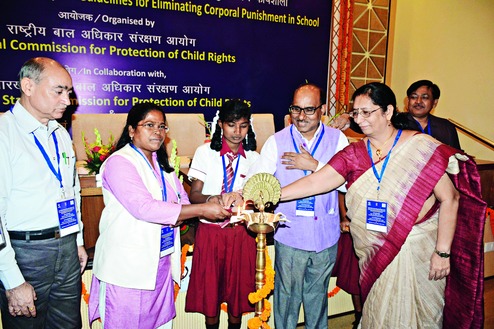
Jamshedpur: Spare the rod and spoil the child is an old saying. But, did you know a child who is caned or verbally abused in school can grow up to be a sad or violent adult?
Though corporal punishment is banned in Indian schools, many students are still victims of it. Therefore, National Commission for Protection of Child Rights (NCPCR) organised a daylong workshop on Tuesday to sensitise teachers and principals of Jamshedpur and nearby areas on building a happy and yet disciplined environment for children.
Organised at SNTI Auditorium in Bistupur, participants included National Rural Employment Programme director Ranjana Mishra; chairperson of Jharkhand State Commission for Protection of Child Rights Arti Kujur; regional deputy director of education Kolhan Arvind Vijay Bilung; technical expert from NCPCR, New Delhi Paresh Shah; assistant professor of psychiatry, Central Institute of Psychiatry in Ranchi, Nishant Goyal; education department officials of East Singhbhum department and 250 teachers and principals.
The session clarified corporal punishment, legalities associated with it and alternative disciplinary measures.
While Goyal spoke about ways that schools can initiate to make positive impact on a child, other resource persons stressed on legal consequences on teachers. A teacher found guilty of corporal punishment can be suspended, sacked or even jailed for three years.
"Teachers should use positive words. Praising a child for good behaviour and abstaining from individual humiliation are simple yet powerful techniques to change even naughty children. We can refer difficult children to counsellors. Each child is different," said Goyal.
Goyal added that while short-term effects of corporal punishment could be depression, anxiety and restlessness, long-term ones could well be aggression or drug abuse.
Teachers asked questions ranging from "how to handle a difficult child", "to what extent should children be praised" and "how to divide time between slow and fast learners".
NCPCR will next organise the session in Patna.
Corporal punishment in India was legally banned by Right to Free and Compulsory Education Act, 2009. Under RTE Act, Section 17(2), teachers found guilty can face disciplinary action under the service rule of the person which includes suspension or termination. Under Juvenile Justice Act, 2015, a guilty person can be punishable with imprisonment for a term which may extend to three years.











